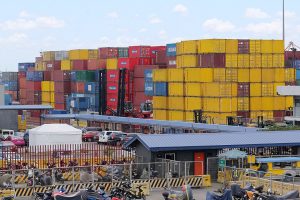THE SENATE is working to ratify the Regional Comprehensive Economic Partnership (RCEP) trade agreement within the first quarter, Senate President Juan Miguel F. Zubiri said.
“The RCEP ratification is a priority of our Senate,” Mr. Zubiri said in an ambush interview on the sidelines of a forum organized by the Department of Environment and Natural Resources in Cagayan de Oro City on Feb. 4.
“Within the first quarter, kaya siya (ratification is possible),” he added.
The Senate Committee on Foreign Relations is holding a hearing on the RCEP on Feb. 7 (Tuesday) which will be attended by stakeholders. Mr. Zubiri said there are plans to hold another hearing for opposition groups.
“Eventually, I’ll hopefully be able to get 16 votes to ratify that. We need it,” he added.
Last month, the Trade department pressed the Senate to ratify the RCEP before end-March, saying the Philippines is missing out on the trade deal’s benefits.
Billed as the world’s largest free trade agreement, the RCEP entered into force for Australia, Brunei Darussalam, Cambodia, China, Japan, Laos, New Zealand, Singapore, Thailand and Vietnam on Jan. 1, 2022. South Korea, Malaysia and Indonesia have also ratified the RCEP.
“We’re the only non-signatory to this economic partnership,” Mr. Zubiri said, warning that failure to ratify the deal will affect trade with other countries.
“If we get steel imports from China, they could charge us higher tariffs coming here because we are not a part of the RCEP. When we want to export bananas and pineapple from say Bukidnon to Japan and Korea, they will take our products but at a higher tariff rate,” he added.
The RCEP was ratified by Former President Rodrigo R. Duterte in September 2021, but the previous Senate did not give its concurrence due to concerns over the free trade deal’s impact on the agriculture sector.
President Ferdinand R. Marcos, Jr., who concurrently serves as the Agriculture secretary, earlier urged the Senate to ratify the RCEP, according to the Presidential Communications Office.
Mr. Zubiri assured the agriculture sector would be protected under the RCEP.
“It’s definitely beneficial for our country to be a part of RCEP… But under the RCEP, there is a protection clause for the next 10 years. In other words, there will not be a free flow of goods for the next 10 years for agriculture, just to protect them (local sector),” Mr. Zubiri said.
Agriculture stakeholders previously said that the Philippines is unprepared to join the RCEP, citing the lack of cold storages and irrigation facilities that would hamper the competitiveness of local farmers.
Mr. Zubiri said there is a 10-year protection clause under the RCEP, adding that there is enough time to modernize and increase the competitiveness of the local agriculture sector. — Revin Mikhael D. Ochave
